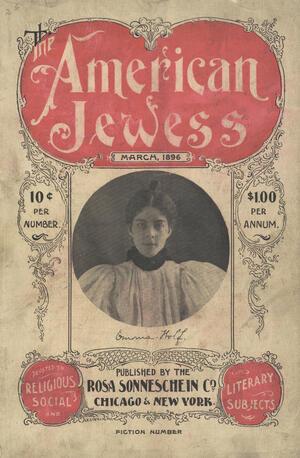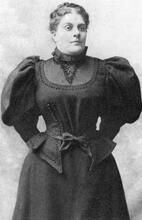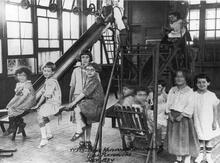Emma Wolf
Emma Wolf, daughter of Jewish immigrants from Alsace who settled in the San Francisco Bay Area, grew up in an upper-middle-class household, the fourth of eleven children. Her writing reflects the social world in which her siblings -- and to a lesser extent she, because of a physical disability – participated. A pioneering writer whose works were widely read and discussed within and outside the American Jewish community, she tackled questions of Jewish relationship to and participation in Christian American society and women’s changing roles in the era of New Womanhood. She opened up the world of bourgeois San Francisco Jewish society to literary scrutiny and examined questions of theological and social import regarding the relationship between white liberal Protestantism and Reform Judaism.
Early Life & Education
The fourth of eleven children, Emma Wolf was born on June 1, 1865, to Simon and Annette (Levy) Wolf, Jewish immigrants from Alsace who had settled in the San Francisco Bay area. Her father had achieved financial success as a businessman during California’s mining boom. In 1878 her father died unexpectedly on the way home from a business trip and her mother was left to raise her family on her own. Wolf was therefore raised in a comfortable middle-class lifestyle but with some financial uncertainty. The Wolfs lived in fashionable San Francisco neighborhoods, vacationed at summer resorts in the Santa Cruz Mountains, and employed immigrant Irish and Chinese servants to help care for the large family.
Emma Wolf and her sisters attended California public schools, and she graduated from the San Francisco Girls’ High School, known for its strong emphasis on literacy. One of her childhood friends was Rebekah Bettelheim (1864-1951), the daughter of the progressive rabbi Aaron Bettelheim, who would go on to become a leader in American Judaism after her marriage to Rabbi Alexander Kohut. In her memoir, Bettelheim described walks the two girls took as they conversed about the sacrifices they had to make in order to retain Jewish identity, and the sense of difference they felt as Jews in upper-crust San Francisco societal life.
Although middle-class San Francisco Jews maintained separate social circles from non-Jews, their clubs and organizations, as well as their religious worship, resembled those of their Christian counterparts. Wolf’s family were early members of Temple Emanu-El, a leading Reform synagogue that advocated for the remaking of Jewish liturgy and ritual to conform with Enlightenment values and bourgeois decorum. Wolf took part in the 1890s women’s club movement that allowed women to engage together in literary and educational pursuits, extending the bourgeois, feminine moral influence of the “women’s sphere” to the broader public sphere; she was a member of the Philomath Club, the San Francisco Bay Area’s first secular organization exclusively for Jewish women.
Publication
Although Wolf appears to have written short stories as an adolescent, her first full-length published work was her novel Other Things Being Equal (1892). The novel, published by Chicago’s A. C. McClurg, was reissued multiple times and is currently in print again thanks to the 2002 critical edition issued by Wayne State University Press. The novel’s popularity was likely due to its controversial theme of Jewish-Christian intermarriage. Wolf depicts a romance between a Jewish protagonist, Ruth Levice, and a white Protestant man, Dr. Herbert Kemp, culminating in their decision to marry. The novel demonstrates the protagonists’ compatibility in class, education, and outlook, and the central struggle is between Ruth Levice’s love for Dr. Kemp and her respect for the wishes of her father, who initially rejects Ruth’s request for his approval of the marriage. Ultimately, after Ruth has refused to marry Dr. Kemp out of respect for parental authority, her father overturns his decision on his deathbed and agrees to their union.
Wolf’s second novel, A Prodigal in Love (1894), centers on a family of orphaned sisters who must navigate the world of love and responsibility as women without parental guardians. The oldest sister, Constance, in charge of the family, refuses to marry her admirer Hall Kenyon because of her responsibilities to care for her younger sisters. Her impetuous younger sister Eleanor sneaks away on a surreptitious trip to Sausalito, where she encounters Kenyon attempting suicide because of Constance’s rejection. After Eleanor and Kenyon are caught in Sausalito after the last ferry has left and must spend a night away from home, Constance insists that Eleanor marry Kenyon to protect her reputation. Ultimately Kenyon and Eleanor come to love one another and Constance finds love with the steadfast Geoffrey Brunton, the family friend and lawyer who has served as the women’s legal guardian in their father’s absence. As in Wolf’s previous novel, characters wrestle with self-sacrifice for the sake of family loyalty.
In The Joy of Life (1896), Wolf similarly contrasts steadfast and passionate siblings. This time, she focuses on two brothers, Anthony and Cyril Trent, and the women who enter their lives. As the novel progresses we learn of Anthony’s upright, stern, and loyal honesty and dedication to the business he inherited from his father, and his plans to marry a wealthy bride to maintain financial stability. We also learn of Cyril’s earnest and secret philanthropy, which he gives to compensate for an early sin, and of the apparent charismatic purity with which he conducts his life. As Anthony falls in love with the feisty opinionated Barbara Gerrish, a formerly working woman who is friends with the wealthy young woman he had been pursuing, Gerrish herself falls in love with Cyril. Even after Cyril’s death in a motor accident, Gerrish holds on to romantic notions of love despite the demands of logic, thereby denying Anthony the possibility of marriage to the woman he has come to admire.
Heirs of Yesterday (1900) centers on a Jewish woman, Jean, who falls in love with Philip May, the son of her father’s best friend. Philip had gone away to Harvard and Europe for his education as a medical doctor and returns to San Francisco determined to “pass” as a Christian in both social and professional circles. Philip finds this goal increasingly untenable, both because of his love of Jean and because of an encounter with a Christian childhood acquaintance who knows him to be a Jew. Although Jean finds him repugnant for having attempted to turn away from his community, the two ultimately resolve their differences, creating romantic possibility. The novel ends with the outbreak of the Spanish-American War, as world events intrude on domestic affairs and create a need for national, rather than marital, unity.
Wolf’s final novel, Fulfillment: A California Novel (1916), is a romance featuring the character Gwen Heath, who marries George Leland, a man she does not love, in order to escape poverty and ultimately comes to love him after their estrangement and the birth of their child. Again contrasting passionate and headstrong Gwen with her brave and hardworking sister Deborah, the author solicits sympathy for both characters in trying to maintain control of lives bounded by societal expectations surrounding love and marriage. This novel received praise for its attention to local color.
Wolf also contributed to periodicals, including ten stories published in the monthly magazine The Smart Set between 1902 and 1911, each involving plots about the complexities of society women’s newfound independence. In addition, she contributed a story and a poem to American Jewess and in 1896 the journal published a profile of the author. Wolf’s portrait appeared on the cover of the journal.
Contributions
Emma Wolf conducted a significant correspondence with British-Jewish writer Israel Zangwill, with whom her writing was in literary conversation. Zangwill referred to Wolf’s writing as “the best product of American Judaism since Emma Lazarus.” Nevertheless, much of her work did not deal directly with Jewish themes, perhaps because of her own marginalization as a Reform Jewish woman writing outside the themes of popular interest among consumers of Jewish fiction of the time, namely the ghetto realism that dominated early twentieth-century American Jewish writing (Cantalupo). Some of her writing on Jewish themes was likely never published because of a lack of interest by the major Jewish publisher of the time, the Jewish Publication Society of America (Cantalupo, Harrison-Kahan).
Still, Wolf made significant contributions to Jewish American literature with Other Things Being Equal and Heirs of Yesterday, opening up the world of bourgeois San Francisco Jewish society to literary scrutiny and examining questions of theological and social import with regard to the relationship between white liberal Protestantism and Reform Judaism. In addition, she was significant as a California author whose work illuminated the regional character of San Francisco, which was unusual at a time when the publishing industry was concentrated on the East Coast. When asked about her focus on the city, Wolf simply stated, “I have never lived anywhere else, so what other city could I describe as well?”
Due to a congenital defect, possibly exacerbated by polio, Wolf experienced limited mobility. She lived and wrote in her family’s home and led a restricted life that was expanded by her capacity as a writer. A 1894 article in the San Francisco Chronicle about her writing and personal life described her study as “dainty, small, and in scrupulous order,” and her desk as “such a desk as all women use whereon to write perfumed notes, not serious and substantial enough in appearance for a bulky notebook and two successful novels.” The article explained that her secluded lifestyle enabled her writing: “She has no fancy for society and neer makes calls if she can get out of it…as she is not very strong, she has no household cares, so her entire time is given to reading and writing.” Wolf’s writing extended her influence far beyond her home, as she participated in a world of literature and thought by dint of her pen.
Toward the end of her life, Wolf was confined to a wheelchair and appears to have rarely left her own room. She spent her last sixteen years at Dante Sanitarium in San Francisco, known as a modern luxury hospital and convalescent home with the atmosphere of a spacious private residence. She is buried in Home of Peace Cemetery in Colma, California. She died in San Francisco at the age of 67.
In recent decades, as scholars have sought to uncover the underexamined work of women writers, Wolf’s work has received renewed attention for its keen portrayal of the social, philosophical, and theological nuances of turn-of-the-twentieth century Reform Jewish life, and she has been credited as an overlooked foremother of American Jewish literature.
Selected Works by Emma Wolf
Other Things Being Equal. Chicago: A.C. McClurg, 1892,1893, 1895; revised, 1916. Reissued, ed. and with a critical introduction by Barbara Cantalupo by Wayne State University Press, 2002.
“Brissac’s Little Debt.” The Wave (February 1892).
A Prodigal in Love. NY: Harper, 1894.
“Vanity.” American Jewess 2.4 (July 1895): 183.
"Eschoscholtzia (California Poppy)." American Jewess 2.4 (January 1896): 195.
The Joy of Life. Chicago: A.C. McClurg, 1896.
"One-Eye, Two-Eye, Three-Eye." American Jewess 2.6 (January 1896): 279-90.
“Social Life in American Cities: San Francisco.” The Delineator (September 1897): 338-339.
Heirs of Yesterday. Chicago: A.C. McClurg, 1900. Reissued, ed. and with a critical introduction by Barbara Cantalupo and Lori Harrison-Kahan, Wayne State University Press, 2020.
"A Still Small Voice." Smart Set 8.2 (October 1902): 157-60.
"A Study in Suggestion." Smart Set 6.3 (March 1902): 95-100.
"The Courting of Drusilla West." Smart Set 9.2 (February 1903): 69-81.
"The End of the Story." Smart Set 14.4 (December 1904): 137-46.
"Tryst." Smart Set 20.3 (July 1905 ): 101-11.
"Farquhar's Masterpiece." Smart Set 18.3 (March 1906): 1-45.
"The Conflict." Smart Set 22.4 (August 1907): 94-104.
The Knot. NY: Ess Ess, 1909.
“The Critical Miss Devine.” The Century (1910): 573-582.
"The Father of Her Children." Smart Set 34.2 (June 1911): 135-40.
Fulfillment: A California Novel. NY: Henry Holt, 1916.
Baym, Nina. Women Writers of the American West 1833-1927. University of Illinois Press, 2012.
Cantalupo, Barbara. “Discovering Emma Wolf, San Francisco Author.” CCAR Journal, 51:1 (2004): 77-84
Cantalupo, Barbara. “Emma Wolf.” Oxford Bibliographies, www.oxfordbibliographies.com.
Cantalupo, Barbara. “Emma Wolf’s Heirs of Yesterday and the Jewish Community of San Francisco in the Late Nineteenth Century.” Studies in American Jewish Literature 22 (2003): 145-153.
Cantalupo, Barbara. “Introduction” to Emma Wolf, Other Things Being Equal. Detroit: Wayne State University Press, 2002.
Cantalupo, Barbara, ed. Emma Wolf’s Short Stories in the Smart Set. NY: AMS Press, 2010.
Cantalupo, Barbara. “The Letters of Israel Zangwill to Emma Wolf: Transatlantic Mentoring in the 1890s.” Resources for American Literary Study 28 (2003): 121-38.
Gradwohl, Rebecca. “The Jewess in San Francisco.” American Jewess 4,1 (1896): 10–12.
Harrison-Kahan, Lori. “‘A Grave Experiment’: Emma Wolf’s Marriage Plots and the Deghettoization of American Jewish Fiction.” American Jewish History 101,1 (Jan. 2017): 5-34.
Harrison-Kahan, Lori. “Ghetto Realism – and Beyond,” in The Oxford Handbook of American Literary Realisms. Oxford: Oxford University Press, 2019.
Harrison-Kahan, Lori. “Pioneering Women Writers and the De-ghettoisation of Early American Jewish Fiction.” In The Edinburgh Companion to Modern Jewish Fiction, edited by David Brauner and Axel Stahler, 19-32. Edinburgh: Edinburgh University Press, 2015.
Irwin, E. P. “San Francisco Women Who Have Achieved Success.” Overland Monthly and Out West Magazine 44, no. 5 (November 1904): 512ff.
Kirzane, Jessica. “Women, Love, and the Reform Jewish Mission: Jewish-Christian Marriage in Emma Wolf’s Other Things Being Equal and its Literary Successors.” American Jewish History (forthcoming).
Lambert, Josh. “Other Things Being Equal.” In JPS Guide: American Jewish Fiction, 5–16. Philadelphia: Jewish Publication Society, 2009.
Lehman, Sophia B. “Wolf, Emma.” American National Biography Online. Oxford University Press, February 2000. http://www.anb.org/articles/16/16-02877.html
Levi, Harry. “Lesson XIV: Emma Wolf, (1865–), Heirs of Yesterday.” In Jewish Characters in Fiction: English Literature, 138–149. Philadelphia: Jewish Chautauqua Society, 1911.
Lichtenstein, Diane Marilyn. Writing Their Nations: The Tradition of Nineteenth-Century American Jewish Women Writers. Indiana University Press, 1992.
Mandel Dena. “Emma Wolf.” Encyclopedia of Jewish-American Literature. Edited by Gloria L. Cronin and Alan L. Berger. New York: Infobase Learning, 2013.
Mandel, Dena Toni Cooper. “A World of Difference: Emma Wolf, a Jewish-American Writer on the American Frontier,” Ph.D. Diss. University of Alaska, Fairbanks, 2008.
Rose, Anne C. Beloved Strangers: Interfaith Families in Nineteenth Century America. Harvard University Press, 2001.
“Writes About Home: Miss Emma Wolf and Her Two Book,” San Francisco Chronicle, July 15, 1894, p. 2.





